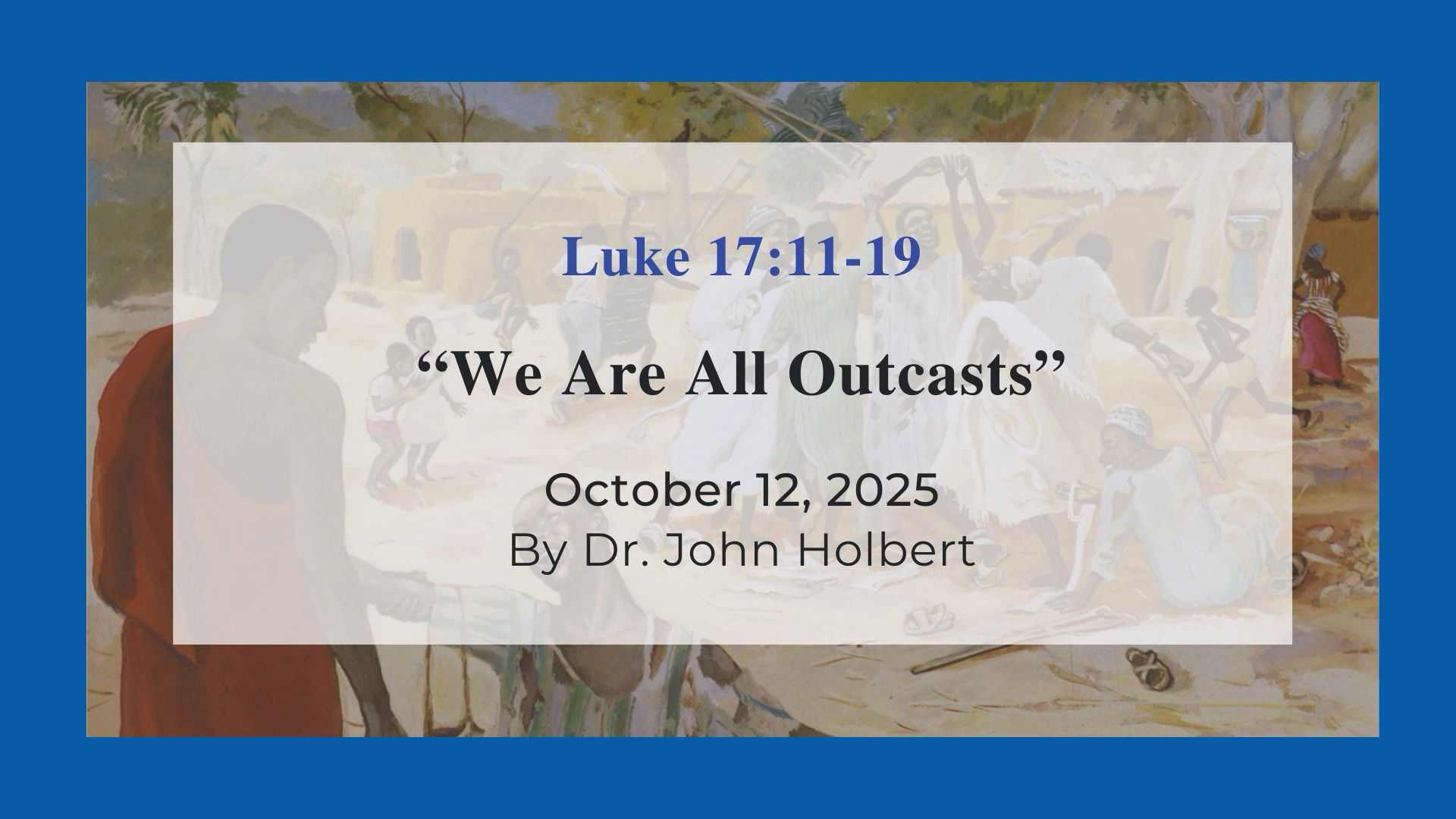We Are All Outcasts - Reflections on Luke 17:11-19, Pentecost 18, Year C
by John C. Holbert on Friday, June 20, 2025

Once again, Luke presents us with a tale, unique to him, of a healing, but this miracle focuses not on the healing itself but rather on the response to the healing. In this way, Luke includes even his disciples in the reality that all of them, and all of us, are in the end outsiders, outcasts in a our world, but potential insiders in a new world that is coming.
Luke begins his story with a confusing bit of geography, “between Samaria and Galilee;” in fact, the latter is a part of the former, or at best the two pieces of ground overlap one another. In any case, Luke is less interested in accurate geography than in theology. Jesus is still on his journey to Jerusalem, and while continuing on that journey, he still has work to do in Samaria, that place of psuedo-Jews who worship in the wrong city and perform rites unlike any traditional Jews would recognize. The actors in the story are ten men who all are lepers. Of course, we know leprosy as Hansen’s disease, a brutal malady that disfigures its victims and passes from person to person by physical contact. It is unlikely that all of these “lepers” were so afflicted, but in the ancient world any debilitating skin disease might be construed as that most cruel and dangerous one. Hence, all those with the physical signs were forced to live apart from the community (see Num.5:2-3), and when they traveled, needed to warn others by shouting out their presence (Lev.13:45-46). But these ten lepers do not shout in warning, but cry out for mercy.
Only here in vs.13 is Jesus called “master” (epistates) by someone not a disciple. Their cries for mercy echo the cry of the rich man to Abraham in Luke 16:24. Such cries rise as a part of the anticipation of the coming of God through the power of God’s prophet. In response to their entreaty, Jesus tells them to “show themselves to the priests,” whose duty it was to determine whether the supplicant was in fact clean or still a dangerous leper (Lev.13:3f). In fact, Lev.14:1-32 offers a lengthy discussion of ritual actions required for certification of cleanliness and reentry into the community. Yet, in the Luke’s tale, the need for all that priestly activity is abrogated, because “as they were on their way” to see the priests, “they were made clean” (Luke 17:14). It seems that merely by sending the ten to the priests, the healing has occurred.
“One of them, when he saw he was healed, turned back, and glorified God with a loud cry, falling at Jesus’s feet in thanks” (Luke 17:15-16). Only one of the ten decided it was important to go back and thank the one who effected the cure, apart from any priestly actions. And, Luke adds, ‘this man was a Samaritan” (Luke 17:16). Immediately, of course, we are reminded of the much more famous story of a “good Samaritan” in Luke 10. There, the outcast Samaritan showed deep love for the stranger fallen among thieves, while here the Samaritan shows deep faith, making it clear who it was that brought about his cure. The surprise here, as there, is that the Samaritan is the hero of the tale, an outcast, a marginal Jew at best.
Jesus’s response to this thankful Samaritan is instructive. “Were not ten cleansed? Where are the other nine? Were none found to return and give glory to God save this foreigner?” (Luke 17:17-18) The word used for foreigner here is allogenes, the only time the word is found in the New Testament. It is a noun formed of two words: allo, “other” and genes, “family”. Hence, this leper is from “another family.” But because he returned to give thanks, Jesus pronounces that “your faith has saved you (or “made you well, whole”) Luke 17:19. In short, the one from another family has now through his faith become one of the new family in Jesus.
There is no use speculating about the nine who did not return to give thanks, apparently taking their new health and living out their lives. It is the Samaritan who is model for us, and that in two ways. First, he expresses gratitude for what Jesus as God’s prophet has done for him, and thus is overtly grateful for his new health and wholeness and community. Second, he was outcast and is now no longer excluded from the rule and reign of God. His faith, his public expression of thanks to Jesus has made real his faith in the master, and has effected his inclusion in Jesus’s beloved community.
We, too, must strive to become the tenth leper, recognizing that without thanking God for including us in the community of the faithful, we remain forever outcasts, forever marginalized from God’s desire for our inclusion in the divine community. May we, through our faith, find our way from outside to inside, and join the beloved community called by Jesus, both then and now.
